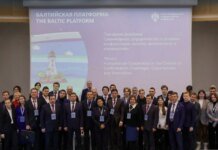
Mobile saunas have been one of the most alluring additions to weekend retreats, country cabins, holiday homes, and gardens. These little portable buildings bring the heat therapy luxury of the spa to your outdoor wellness in any location. So, you do not have to necessarily keep it next to a lake, take it to your holiday home, or simply turn your backyard into a sauna area.
Mobile saunas are loaded with the features of adaptability and comfort that make them the ideal choice for people who are into sudden weekend getaways or want to have a unique wellness feature in their recreational spaces. However, before deciding on the right one, it is essential to plan carefully due to the large number of models, materials, and configurations. You ought to have a sauna that is in harmony with your lifestyle, travel needs, and nature, and at the same time, it should be made of good quality and safe for use.
Why Eastern Europe Has Become a Magnet for Global Tech Talent
Before the remote work revolution, Eastern Europe was already equipped with a strong technical culture. The region’s emphasis on math, engineering, and computer science for many years has resulted in a workforce that is very competent in solving problems and has a strong educational background.
Nowadays, the mentioned countries such as Serbia, Bulgaria, Romania, Poland, Ukraine, North Macedonia, and Croatia have become the locations where large communities of developers are residing. These developers are capable of and domestically engaged in a wide range of fields such as backend engineering, mobile development, AI, DevOps, cybersecurity, and blockchain. Also, they’re quick and efficient in their integration into global teams due to their up-to-date knowledge and usage of Western technologies and frameworks.
Creating Smooth Collaboration Across Borders
One of the issues that are worrying companies the most when they are looking for remote staff in other regions is the question whether collaboration will be as natural as before. Luckily, Eastern Europe people communicate in the style which is very similar to the Western one. The style is direct, efficient, and professional. This way it is possible to remove interaction friction which happens during the day and thus allows projects to go their way.
Technical collaboration becomes far better when the teams have the same processes. Being clear in documentation, having a shared project board, and using version control practice in work make everything transparent. Remote teams will be at their best performance when there is nothing that only one person knows in his/her head, every idea, change, and requirement is written down for later understanding.
How the Right Partner Simplifies Team Building
While some companies hire developers directly, many prefer to work with specialized partners who understand the local talent landscape. Finding the right developers, managing local compliance, handling payroll, and maintaining a strong recruiting pipeline can be difficult for businesses unfamiliar with the region.
In the middle of these decisions, many companies begin exploring experienced partners who streamline the entire process. They often look for organizations that provide vetted talent, local expertise, and long-term support. This is why many international companies eventually discover trusted regional partners like Connect, who help businesses bridge the gap between global demand and Eastern European talent. These partnerships reduce risk, accelerate hiring, and ensure that companies receive developers who truly match their technical and cultural expectations.
Finding the Right Balance Between Cost and Quality
While it is frequently stated that one of the advantages of hiring Eastern European talent is competitive pricing, it is nevertheless crucial to be cost-wise. The area is not offering cheap labor, but rather an excellent value because the quality-to-cost ratio is extremely high.
There are variations in salaries from one country to another, as well as from one city to the next and different levels of seniority, however, the one thing that remains unchanged is that companies get highly skilled engineering capabilities at about one-fifth of the Western costs. On the contrary, solely concentrating on the cheapest option can result in negative consequences in the long run. The ultimate objective should always be to find the right talent that fulfills the company’s technical and strategic requirements.
Building Long-Term Success Through Trust and Ownership
Trust is the main factor which makes remote teams successful. Developers who receive good energy from the company and feel that they are an important part of the team and have the power to make decisions then they will produce supreme results. The process of trust gaining starts with the transparency such as sharing roadmaps, giving more details, and at the same time giving liberty to developers to decide their technical side rather than closely managing their work.
Developers from Eastern Europe are generally good performers when they have control over their work. They take a lot of satisfaction in being part of the right projects instead of being treated like standard pieces in the chess game. The companies which lead this feeling of ownership among their staff, therefore, experience stronger engagement, higher retention, and more creative thinking.
Conclusion: Eastern Europe Is a Strategic Advantage, Not Just a Hiring Option
Constructing a capable remote development team in Eastern Europe is undoubtedly among the most intelligent decisions that contemporary companies can make. The area is packed with talented people, has a great work ethic, is culturally compatible, and has a very promising future. However, success is not guaranteed; it is the outcome of having the appropriate framework, clear communication, and developers treated as a key part of the business rather than simply as outsourced labor.
Firms that dedicate resources to building relationships, giving their teams authority, and working with seasoned local partners, are the ones that really tap into the full potential of the tech talent pool in Eastern Europe. The outcome, therefore, is not merely a remote team but a genuine viable company extension.

































